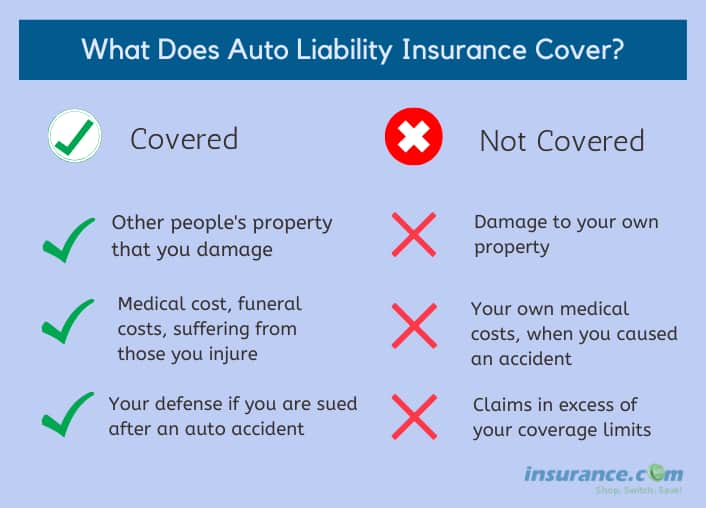Understanding Car Insurance Coverage for Injuries

Car insurance that pays for your injuries weegy – When you’re involved in a car accident, your injuries are a major concern. Thankfully, car insurance policies offer various coverages to help you pay for medical expenses and other related costs. Understanding these coverages is crucial to ensure you have adequate protection in case of an accident.
Personal Injury Protection (PIP) Coverage
Personal Injury Protection (PIP) coverage, often referred to as “no-fault” coverage, is a type of insurance that pays for your medical expenses and other related costs, regardless of who caused the accident. PIP coverage is mandatory in many states, and it can be a valuable resource in case of an accident.
PIP coverage typically covers the following:
- Medical Expenses:This includes expenses for doctor visits, hospital stays, surgery, rehabilitation, and other medical treatments.
- Lost Wages:If you’re unable to work due to your injuries, PIP coverage can help replace a portion of your lost income.
- Other Expenses:This can include expenses for things like funeral costs, childcare, and transportation.
The amount of PIP coverage you need depends on your individual circumstances, including your health, financial situation, and the amount of coverage available in your state.
Medical Payments Coverage (MedPay)
Medical Payments Coverage (MedPay) is an optional coverage that supplements PIP coverage. It can pay for medical expenses that exceed your PIP coverage limits. MedPay can also cover medical expenses for passengers in your car, even if they are not covered by PIP.MedPay is a valuable addition to your car insurance policy, as it provides an extra layer of protection in case of a serious accident.
However, it’s important to note that MedPay coverage is usually limited to a specific amount, and it may not cover all of your medical expenses.
Factors Influencing Injury Coverage Costs
The cost of car insurance coverage for injuries is determined by a multitude of factors, each contributing to the overall premium you pay. Understanding these factors can help you make informed decisions about your coverage and potentially save money on your premiums.
Age
Age is a significant factor in determining injury coverage costs. Younger drivers, especially those under 25, are statistically more likely to be involved in accidents. This increased risk translates to higher premiums for younger drivers. Conversely, older drivers, with more experience and potentially safer driving habits, may enjoy lower premiums.
Driving History, Car insurance that pays for your injuries weegy
Your driving history plays a crucial role in calculating your injury coverage costs. A clean driving record with no accidents or traffic violations will generally lead to lower premiums. Conversely, a history of accidents, speeding tickets, or DUI convictions will increase your premiums significantly.
Insurance companies view drivers with a history of incidents as higher risk, reflecting the likelihood of future claims.
Location
The location where you reside can significantly influence your injury coverage costs. Urban areas with high traffic density and congested roads often have higher accident rates, leading to higher premiums. Conversely, rural areas with lower population density and less traffic generally have lower accident rates and lower premiums.
Vehicle Type
The type of vehicle you drive also affects your injury coverage costs. Sports cars and luxury vehicles, known for their performance and higher value, are generally considered higher risk due to their potential for higher speeds and more severe accidents.
As a result, insurance companies may charge higher premiums for these vehicles. Conversely, smaller and less powerful vehicles are often associated with lower premiums.
Pricing Strategies of Different Insurance Providers
Insurance companies employ different pricing strategies for injury coverage. Some companies may offer lower premiums for drivers with clean driving records and good credit scores, while others may focus on offering comprehensive coverage options with higher premiums. Understanding the pricing strategies of different providers can help you choose the insurance company that best fits your needs and budget.
Navigating the Claims Process for Injury Coverage: Car Insurance That Pays For Your Injuries Weegy

After an accident, understanding the claims process for injury coverage is crucial to ensure you receive the necessary compensation for your medical expenses and other related costs. This process can be complex, but following the steps Artikeld below can help you navigate it effectively.
Filing a Claim for Injuries
Filing a claim is the first step in seeking compensation for your injuries. The process typically involves contacting your insurance company, providing them with the necessary information, and completing the required paperwork.
- Contact your insurance company:As soon as possible after the accident, contact your insurance company and report the incident. Provide them with the date, time, and location of the accident, as well as details about the other parties involved.
- Complete the necessary paperwork:Your insurance company will provide you with claim forms to fill out. Be sure to provide accurate and detailed information about the accident and your injuries. Include details about your medical treatment, including the names of doctors and hospitals, dates of treatment, and costs incurred.
- Gather supporting documentation:To support your claim, gather all relevant documentation, such as police reports, medical records, and bills. This documentation will help validate your claim and expedite the process.
Documenting Injuries and Medical Expenses
Accurate and thorough documentation of your injuries and medical expenses is essential for a successful claim. This includes:
- Medical records:Obtain copies of all medical records related to your injuries, including doctor’s notes, diagnoses, treatment plans, and prescriptions.
- Bills:Keep all medical bills, including hospital bills, doctor’s fees, and pharmacy bills. Make sure these bills are detailed and include all relevant information, such as the date of service, the provider’s name, and the amount charged.
- Photographs:Take photographs of your injuries, including any visible wounds, bruises, or scars. This visual documentation can help support your claim and provide evidence of the extent of your injuries.
- Lost wages:If you miss work due to your injuries, keep track of your lost wages. You may need to provide documentation from your employer confirming your wages and the period of time you were unable to work.
The Role of Insurance Adjusters
Insurance adjusters play a crucial role in evaluating claims and determining compensation. They are responsible for investigating accidents, reviewing medical records, and assessing the extent of injuries. They will work with you to gather information, review documentation, and negotiate a settlement.
- Investigation:Adjusters will conduct their own investigation to gather information about the accident, including witness statements, police reports, and vehicle damage reports. They will also review your medical records to determine the severity of your injuries.
- Negotiation:Once the adjuster has completed their investigation, they will begin negotiating a settlement with you. They will consider the severity of your injuries, your medical expenses, and your lost wages. They may also consider other factors, such as pain and suffering, permanent disability, and loss of earning capacity.
Understanding the Scope of Injury Coverage Benefits

Car insurance that provides injury coverage aims to protect you financially from the medical expenses and other costs associated with injuries sustained in an accident. This coverage, often referred to as Personal Injury Protection (PIP) or MedPay, can be a lifeline in helping you recover and rebuild your life after a car accident.
Types of Medical Expenses Covered
Your car insurance can help cover a wide range of medical expenses, including:
- Doctor Visits:This includes visits to primary care physicians, specialists, and emergency room visits.
- Hospital Stays:Coverage extends to inpatient care, including surgery, intensive care, and other related treatments.
- Rehabilitation:This covers therapies such as physical therapy, occupational therapy, and speech therapy to help you regain function and mobility after an injury.
- Prescription Medications:Your insurance may cover the cost of prescription medications necessary for your recovery.
- Medical Supplies:This includes items like crutches, wheelchairs, and bandages.
- Ambulance Transportation:Coverage for transportation to and from medical facilities.
Limitations of Coverage
While injury coverage offers significant financial protection, it’s crucial to understand its limitations:
- Benefit Caps:Most car insurance policies have a maximum limit on the total amount of injury coverage benefits payable. This limit can vary significantly depending on your policy and state regulations.
- Exclusions:Some injuries may be excluded from coverage, such as those caused by pre-existing conditions or injuries sustained outside a car accident.
- Deductibles:Your policy may require you to pay a deductible before benefits kick in. This deductible is a fixed amount that you pay out-of-pocket for each covered claim.
- Co-pays and Co-insurance:Some policies may require you to pay a co-pay or co-insurance percentage for each medical service, even after meeting the deductible.
Lost Wages and Other Financial Burdens
Beyond medical expenses, injury coverage can also help with financial burdens related to lost wages and other expenses.
- Lost Wages:Some policies provide coverage for lost wages if you’re unable to work due to your injuries. This coverage helps replace a portion of your income during your recovery period.
- Other Expenses:Coverage may extend to other expenses such as home healthcare, childcare, and transportation costs.
Choosing the Right Car Insurance for Injury Protection
Selecting the right car insurance policy is crucial for safeguarding your financial well-being in the event of an accident. When it comes to injury protection, your policy should provide comprehensive coverage to address medical expenses, lost wages, and other related costs.
This section delves into factors to consider when choosing car insurance that prioritizes injury protection.
Comparing Car Insurance Providers for Injury Coverage
Different insurance providers offer varying levels of injury coverage and pricing. To make an informed decision, it’s essential to compare policies across multiple providers. The table below provides a sample comparison of injury coverage options and pricing for three popular insurance providers.
Note that these figures are for illustrative purposes and may vary based on individual factors.
| Provider | Injury Coverage Options | Estimated Annual Premium |
|---|---|---|
| Provider A | $50,000 per person/$100,000 per accident | $1,200 |
| Provider B | $100,000 per person/$300,000 per accident | $1,500 |
| Provider C | $250,000 per person/$500,000 per accident | $1,800 |
Factors to Consider When Selecting Car Insurance for Injury Protection
When choosing car insurance that prioritizes injury protection, it’s essential to consider several factors. This checklist provides a comprehensive overview of key considerations.
- Coverage Limits:Determine the amount of coverage you need based on your individual circumstances and potential financial risks. Consider factors like your age, health, and driving habits.
- Deductibles:Choose a deductible that balances affordability with financial protection. A higher deductible may result in lower premiums, but you’ll need to pay more out-of-pocket in case of an accident.
- Medical Payments Coverage (MedPay):This coverage helps pay for medical expenses regardless of fault. Ensure the policy provides sufficient MedPay to cover potential medical costs.
- Personal Injury Protection (PIP):This coverage provides benefits for medical expenses, lost wages, and other related costs, regardless of fault. Choose a policy with adequate PIP coverage to ensure financial stability during recovery.
- Uninsured/Underinsured Motorist Coverage (UM/UIM):This coverage protects you in case of an accident with a driver who doesn’t have insurance or has insufficient coverage. Ensure your policy includes UM/UIM coverage to safeguard your financial interests.
- Discounts:Explore available discounts to reduce premiums. Many insurers offer discounts for safe driving records, good credit scores, and other factors.
- Customer Service and Claims Process:Choose an insurer with a reputation for excellent customer service and a streamlined claims process. This can significantly impact your experience during a stressful time.
Recommendations for Individuals with Specific Needs
Individuals with specific needs, such as pre-existing medical conditions or high-risk driving habits, require tailored insurance solutions. Here are some recommendations for these groups:
- Pre-existing Medical Conditions:Individuals with pre-existing medical conditions may require higher coverage limits to ensure sufficient protection in case of an accident. Consider obtaining additional coverage through supplemental insurance policies.
- High-Risk Driving Habits:Individuals with high-risk driving habits, such as a history of accidents or traffic violations, may face higher premiums. Explore options like defensive driving courses or other measures to reduce premiums.
Expert Answers
What is the difference between PIP and MedPay?
PIP (Personal Injury Protection) is typically a broader coverage that covers medical expenses, lost wages, and other related costs, while MedPay (Medical Payments Coverage) is a supplemental coverage that pays for medical expenses regardless of fault.
Is PIP coverage mandatory in all states?
No, PIP coverage is not mandatory in all states. Some states require it, while others offer it as an optional coverage. Check with your state’s insurance department to learn about the specific requirements in your area.
How do I file a claim for injury coverage?
To file a claim for injury coverage, contact your insurance company as soon as possible after the accident. Provide them with the necessary information, including details of the accident, your injuries, and any medical expenses incurred.
What are some common exclusions for injury coverage?
Common exclusions for injury coverage include injuries caused by intentional acts, injuries sustained outside of a car accident, and injuries resulting from pre-existing conditions.